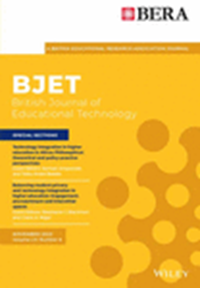Supporting equitable access to learning via SMS in Kenya: Impact on engagement and learning outcomes
Abstract
The use of SMS messaging for education has grown in recent years, with particular attention recently during the Covid-19 pandemic. Mobile phones often have high levels of ownership in low-income contexts compared to computers, and lower connectivity requirements, which arguably make this a more equitable medium than data-heavy online instruction, for example. However, given that gender can be a factor to influence mobile device access and use, it is also important to consider educational applications through a gender lens, to avoid further exacerbating digital divides. In this paper, we present an analysis of server log and evaluation data in relation to a literacy-focused initiative for primary-aged learners carried out in Kenya as part of the Tusome programme and through the SMS-based M-Shule education platform, which does not require an Internet connection or smartphone to run. The extent of engagement with the platform varies according to gender and location within the country. The data also demonstrate a positive impact on learning outcomes regardless of learners' gender and location. Furthermore, the learning gains are shown to be relatively cost-effective in comparison with educational technology interventions in similar contexts. The findings show that this low-connectivity adaptive model has a positive impact on learning outcomes. It is a scalable approach to support a range of learners in Kenya, providing more support to learners who need it, and leading to increased foundational learning outcomes overall. As such, the findings will also be of highly relevant to other low-connectivity contexts.
Practitioner notes
What is already known about this topic
- Mobile phones can be used as a means to support learning, through mobile learning and SMS, particularly in low-connectivity contexts, although there is a lack of rigorous evidence of impact upon learning outcomes.
- Mobile phone device ownership tends to be higher than computer or wired Internet connections in many low-income contexts.
- Software applications which adapt to the learners' level have shown good potential for gender-equitable learning outcomes in low-income contexts; however, these often require an Internet connection in addition to computers or tablets to be run on.
What this paper adds
- There is a lack of contextually relevant evidence of the impact of SMS-based mobile learning applications in low-resource and low-connectivity contexts upon learning outcomes.
- Through analysis of data generated via an experimental design, this study provides evidence that literacy materials delivered through an SMS-based educational platform—M-Shule—can have a positive impact upon learning outcomes.
- Furthermore, gains are equitable in terms of learners' gender, and location, within Kenya.
Implications for practice and/or policy
- Mobile phones can be an effective way of reaching learners to provide additional educational support as part of existing education programmes in low-connectivity environments.
- Learning gains using M-Shule are evidenced as significant and relatively cost-effective.
- Existing high-quality learning materials developed in other media can be effectively adapted to SMS to reach learners particularly who are out-of-school or during periods of educational disruption.




 求助内容:
求助内容: 应助结果提醒方式:
应助结果提醒方式:


